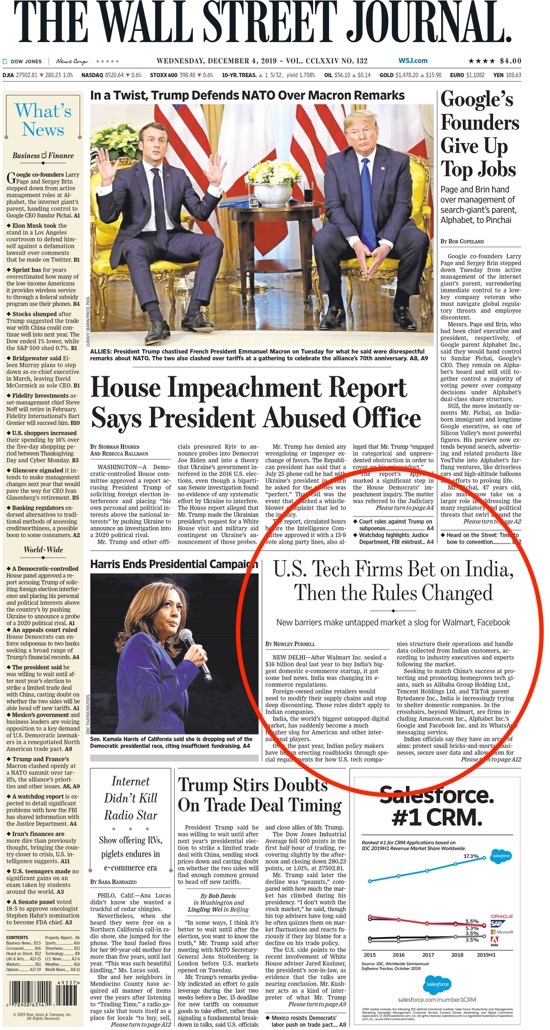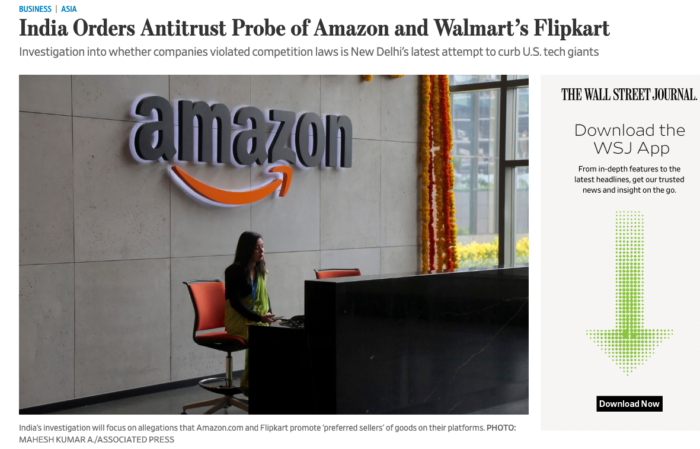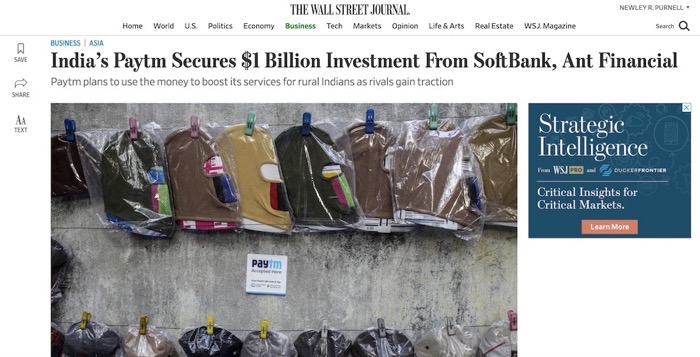
Sent as an email newsletter December 9, 2019.
👋 Hi, friends. Welcome to the latest edition of Newley’s Notes, a weekly newsletter containing my recent Wall Street Journal stories, must-read links on tech and life, and funny dog videos.
📬 Not a subscriber yet? Get it here.
Apologies for NN’s absence last week. After an enjoyable Thanksgiving…your faithful correspondent promptly fell ill. But I’m back now!
✍️ I’m proud to say I had another page one story (the second in a week’s time, following my piece on lending apps), this one out on Wednesday. The headline: U.S. Tech Giants Bet Big on India. Now It’s Changing the Rules.
And the first few grafs:
NEW DELHI – After Walmart Inc. sealed a $16 billion deal last year to buy India’s biggest domestic e-commerce startup, it got some bad news. India was changing its e-commerce regulations.
Foreign-owned online retailers would need to modify their supply chains and stop deep discounting. Those rules didn’t apply to Indian companies.
India, the world’s biggest untapped digital market, has suddenly become a much tougher slog for American and other international players.
It’s not just Walmart, but also the likes of Amazon, Google, and Facebook’s WhatsApp that are facing shifting regulatory sands.
Please give it a read.
📹 Meanwhile, my colleague Liza Lin and I had a story out Friday that has captured a lot of attention (it was even shared on Twitter by Marco Rubio. The headline: A World With a Billion Cameras Watching You Is Just Around the Corner. It begins:
As governments and companies invest more in security networks, hundreds of millions more surveillance cameras will be watching the world in 2021, mostly in China, according to a new report.
The report, from industry researcher IHS Markit, to be released Thursday, said the number of cameras used for surveillance would climb above 1 billion by the end of 2021. That would represent an almost 30% increase from the 770 million cameras today. China would continue to account for a little over half the total.
Fast-growing, populous nations such as India, Brazil and Indonesia would also help drive growth in the sector, the report said.
🎧 Other news: I was on the latest edition of the excellent Asia Matters podcast. In an episode called “What China’s ambitions tell us about tech in Asia,” I joined my ex-WSJ colleague Andrew Peaple and Julian Gewirtz of Harvard to share my perspective from India.
You can listen here, or search for “Asia Matters” on Spotify or in your favorite podcast app.
Okay – enough self-promotion. On to this week’s links…
Here are ten items worth your time this week:
📈 1) Google Management Shuffle Points to Retreat From Alphabet Experiment [WSJ]
“Sundar Pichai’s appointment this week as chief executive of Google parent Alphabet Inc. effectively shifts the focus back on the company’s advertising profit machine and away from its “moonshots” and other potential new businesses.”
👓 2) Warby Parker Wants to Be the Warby Parker of Contacts [Bloomberg]
“At $440 for a year’s supply, the lenses will be slightly cheaper than many daily contacts but will be sold with what Warby says will be a much improved ordering process.”
⛺ 3) How Hipcamp Became the Airbnb of the Outdoors [New Yorker]
“Alyssa Ravasio, Hipcamp’s founder and C.E.O., is not a purist. For her, camping is a leisure activity, an escape valve, a business opportunity, a wealth-redistribution system, and a political strategy: an avenue to environmental awareness, engagement, even activism.”
🍎 4) Apple worth more than US stock index’s energy sector [Financial Times]
“Apple is now worth more than all large-cap US energy stocks put together.”
🧘 5) Buddhism scholars: Meditation apps are fueling tech addiction, not easing stress [Fast Company]
“…Buddhist apps, rather than curing the anxiety created by our smartphones, just make us more addicted to them and, in the end, even more stressed.”
🏎️ 6) These Guys Just Drove an E63 AMG Across America in a Record 27 Hours 25 Minutes [Road & Track]
“After leaving the Red Ball garage on the east side of Manhattan at 12:57 a.m. on November 10, it took Toman, Tabbutt and Chadwick 27 hours and 25 minutes to reach the Portofino Hotel in Redondo Beach, in L.A.’s South Bay. In a car.”
💾 7) Version Museum [VersionMuseum]
“A visual history of your favorite technology.”
🗺️ 8) Map: The most common last name in every country [Reddit]
🏈 9) Sad/heartwarming dog-related story of the week: This college football player lost his parents before Senior Day, but he didn’t walk out alone [CBS News]
“A Michigan State University football player whose parents died before Senior Day walked out with his adopted dogs onto the field for the occasion.”
🐶 10) Dog-related video of the week: This is the most Indian photo bomb [Twitter: @Tim_Kimber]
💡 Quote of the week:
“Ability is what you’re capable of doing. Motivation determines what you do. Attitude determines how well you do it.” – Raymond Chandler
👊 Fist bump from New Delhi,
Newley









